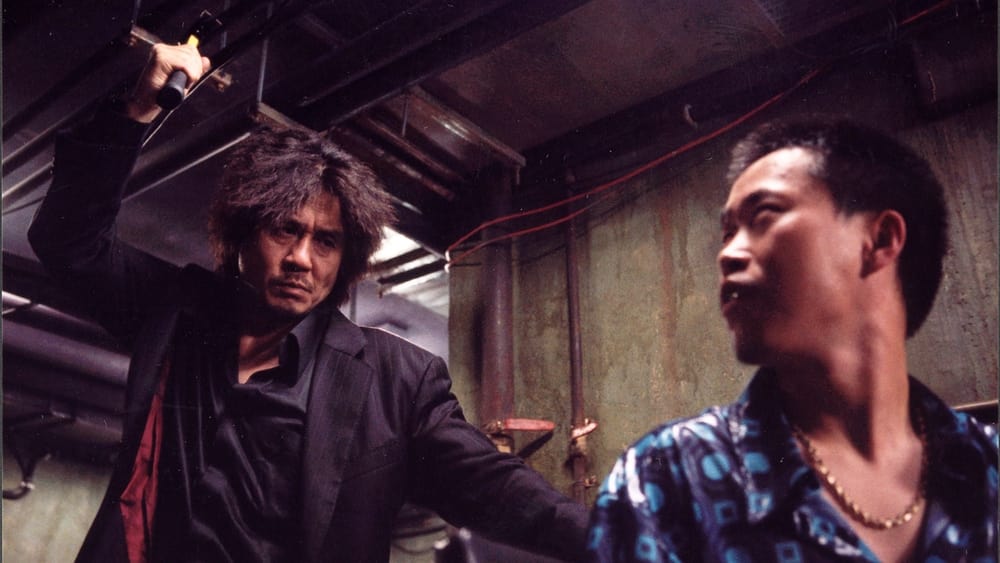-
20 years later, 'Oldboy' remains one of the most shocking and disturbing films of the century
by Mitchel Green - August 24, 2023
|
mitchelgreen34@gmail.com
 source: The Movie Database
source: The Movie Database
I knew it was coming. Despite not having seen the film in almost six years, the agonizing twist at the end of Park Chan-wook’s 2003 film “Oldboy” — in which it is revealed that Lee Woo-jin has tricked Oh Dae-su into having sex with his estranged daughter as revenge for starting a rumor about him having sex with his sister — has stuck with me despite most of the film’s details leaving my mind completely. Revisiting the film for the release of its latest restoration and 20th anniversary, it holds just as much power to make me nearly physically ill as it did when I was a teenager.
It’s not just the unsettling nature of the twist that sears it into your mind, though. There are plenty of equally, if not more, disturbing twists in film history. Park’s narrative construction — specifically, the careful way he slowly doles out details — and the perspective he holds us in for the entire runtime make the final gut punch sting, leaving you in a daze long after you’ve finished the film.
Coming as the second installment of Park’s thematic “Vengeance Trilogy,” to not retread the futility of revenge he explores in his previous feature “Sympathy for Mr. Vengeance,” the filmmaker said he wanted to “deliver a different perspective of vengeance through ‘Oldboy;’ the positive side to let people feel catharsis through the act of vengeance.” That’s undoubtedly how Park portrays violence and vengeance for much of the film. Park doesn’t rush the opening act of the film. He keeps us alone with Oh Dae-su in the hotel prison for what feels like forever. The opening of “Oldboy” drags, but purposely so, and it gives the plotting of Oh Dae-su’s revenge search a focused, propulsive energy that carries through the finale. By the time he is released, the audience wants to get out as much as Oh Dae-su does, and we understand his maniacal anger and frustration at those who put him in captivity for 15 years.
Because of this, the audience is far more receptive to the brutal violence on display throughout the rest of “Oldboy.” Oh Dae-su pulls a prison manager’s teeth out, but you feel a bit of glee from the torment he was forced to endure. He beats up a group of teenagers, but they were needlessly being assholes to him so you get it. Park still manages to make you feel the weight of the violence, however. While Quentin Tarantino characters go on revenge-sparked killing sprees without breaking a sweat, Park makes you feel every punch and every physical exertion in his action set pieces. Shooting the famous hallway fight in a single take isn’t unnecessarily flashy, the sequence’s apparent endlessness makes the viewer as exhausted as Oh Dae-su is by the end of it.
Park doesn’t take the easy way out and say “sometimes violent revenge can just be cathartic.” That would ring false, so he takes the concept of vengeance a step further, and the absurdist extremes through which Lee Woo-jin carries out his own revenge plot make the viewer feel sick for wanting revenge on anyone in the first place. Vengeance can feel cathartic, but the search for ever-greater catharsis means you will inevitably take things too far.
That Lee Woo-jin is an extremely wealthy businessman suggests that Park is critiquing the power that those at the top have over those at the bottom, toying with the livelihoods of people who will never impact their lives in the same way those in the upper classes can impact those below. Oh Dae-su’s slight against Lee Woo-jin isn’t malicious or false, but it is a threat to his and his family’s power and, in his mind, nothing could be worse — to a man so far removed from real people, spreading a truthful rumor and holding someone captive for years and tricking them into having sex with their family member are, if not equivalent acts, certainly a way to reclaim the power he always had over a person of Oh Dae-su’s standing. It’s a form of class violence taken to the extremes and a way for Park to sneak economic commentary into his genre film.
Even putting all of that aside, “Oldboy” remains one of the defining action-thrillers of its time. The new restoration keeps the dingy film-grain aesthetic that plays into the seediness of the film’s plot and setting. Park’s stylish direction is still impressive all these years later, and you even pick up on tricks he would refine in his more recent films — the technique of crosscutting between young Oh Dae-su following Lee Woo-jin and his sister and his older self retracing the steps was perfected in last year’s “Decision to Leave.” And that twist is still one of the most emotionally draining and disturbing of the century so far. When the main reaction of the audience stumbling out of the theater after the screening is “Why?”, I think you’ve done something right.

